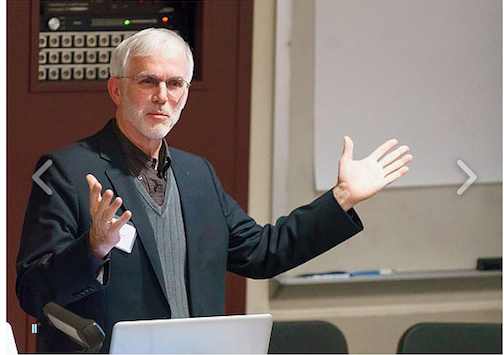
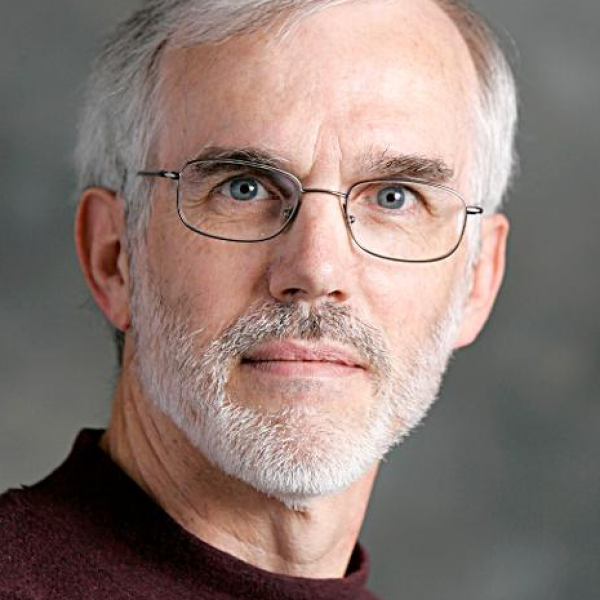
Member since 2019
Kenneth Bozeman
Finding and freeing one’s voice is a process of self-formation. It should be done with respect and reverence.
Member since 2019
Kenneth Bozeman
“Finding and freeing one’s voice is a process of self-formation. It should be done with respect and reverence.“
Kenneth Bozeman, BM, MM, BM, MM, Professor Emeritus of Music, taught at Lawrence University for 42 years, where he chaired the voice department and from which he received two awards for excellence in teaching. He holds performance degrees from Baylor University and the University of Arizona and subsequently studied at the State Conservatory of Music in Munich. He was awarded the Van Lawrence Fellowship by the Voice Foundation in 1994 for his interest in voice science and pedagogy, is the chair of the editorial board of the NATS Journal of Singing, and was inducted into the American Academy of Teachers of Singing in 2019. His former students have sung with Houston, Boston Lyric, Opera Colorado, Washington, Wolf Trap, Seattle, Chicago Lyric, Deutsche Oper Berlin, Dresden, New York City Opera, San Francisco, the Metropolitan, and Santa Fe Opera.
Mr. Bozeman was an active recitalist and performer of oratorio, including singing the tenor roles in the St. Matthew and St. John Passions, the Christmas Oratorio, the B Minor Mass, the Magnificat, and various cantatas of Bach, Handel’s Messiah, Haydn’s Creation, Mendelssohn’s Elijah, and Vaughn Williams Hodie. He has performed with the Milwaukee Symphony, the Wisconsin Chamber Orchestra, the Green Lake Music Festival, the Purgatory Music Festival of Colorado, the Louisville Bach Society, the Historical Keyboard Society of Wisconsin, and on Wisconsin Public Radio’s “Live from the Elvehjem.”
Mr. Bozeman is a frequent presenter at universities and international voice science conferences, has written several articles and two books on acoustic vocal pedagogy, Practical Vocal Acoustics: Pedagogic Applications for Teachers and Singers, and Kinesthetic Voice Pedagogy: Motivating Acoustic Efficiency. Mr. Bozeman is a featured presenter on voice acoustics at national conferences and workshops of NATS, was twice a master teacher for the NATS Intern Program. He continues to be in demand for seminars and master classes and will be a keynote speaker for the British Voice Association conference in 2021and the International Congress of Voice Teachers in Vienna in 2022.
EDUCATIONAL CREDENTIALS:
• Staatliche Hochschule für Musik, Munich, Germany
(non-degree graduate work, Rotary International Fellowship) 1975-76
• University of Arizona, MM in vocal performance, 1975
• Baylor University, BM in vocal performance, 1973
PROFESSIONAL AFFILIATIONS:
• NATS (chair of JOS editorial board, 2000-present)
• Voice Foundation
• PAVA (vice president, 2019-2021)
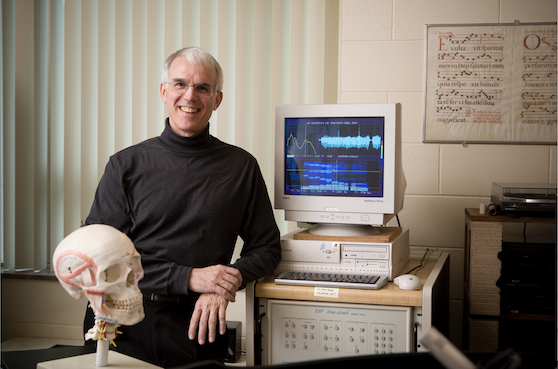
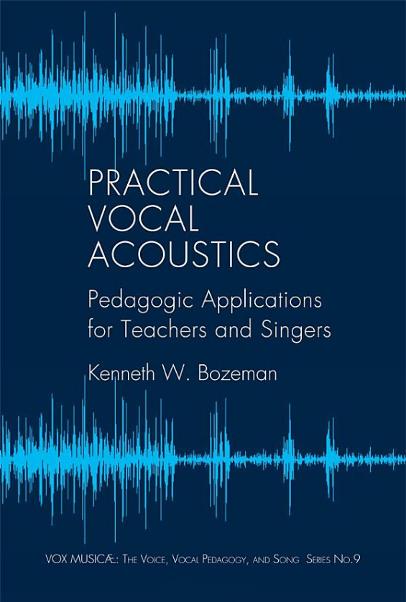
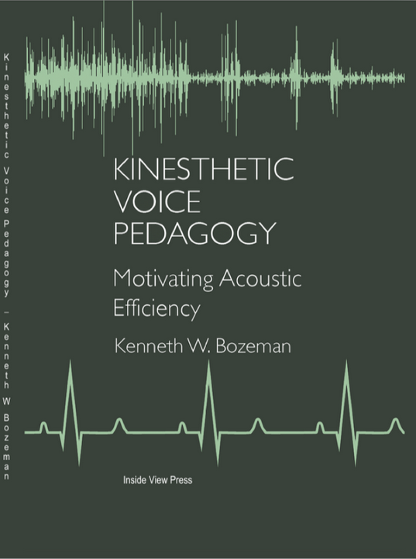
Keynote Address for the British Voice Association 2021 conference: Choice for Voice: “Motivating Acoustic Efficiency: the Necessary Migrations of Sound and Sensation Across Range”, September 4, 2021. (98m)
“Voice, the Muscle of the Soul: Finding Yourself through Finding Your Voice. Lawrence University, Honors Day Convocation, May 22, 2018 (45m)
GENRE SPECIALIZATION/RESEARCH INTERESTS
I primarily taught Western classical literature, plus some musical theater.
I specialized in pedagogy with particular expertise in the pedagogic application of voice acoustics.
Teaching Philosophy
“Voice is a sound caused by the soul by means of the repercussion of the air made in the throat with the intention of signifying something.” (Aristotle)
“Voice is the muscle of the soul.” (Alfred Wolfsohn) It is inherently expressive, occurring in response to the impulse to express feelings. Voice is therefore best “played” by expressive intention. This deep level programming, which is both innate and also acquired (learned), informs and organizes phonation with the most nuanced coordination. Carefully and selectively used, it is at the core of my pedagogic methodology.
“The only reason for mastering technique is to make sure the body does not prevent the soul from expressing itself.” (La Meri, dancer)
Spontaneous singing is most often an expression of joy in living (Victor Fields), a celebration of and participation in the different facets of life, and an affective, aesthetic commentary on it. It can be a cathartic comfort in times of trouble.
The earliest example of vocal pedagogic advice of which I’m aware comes from the Hebrew King David in Psalm 33: “Play skillfully with a shout of joy.”
The singer is the servant of the audience, composer, poet, music, and God. The teacher is there for the student, composer, poet, music, and God. Excellence and service are more important and fulfilling than success (social recognition), but will normally bring some measure of success.
An audience is a privilege not to be abused. They are not there for you so much as you are there for them. Be thoroughly prepared. Try not to burden them with your issues or struggles. Rather, share with them what your unique soul has to say.
Beauty is simple but difficult. It takes discipline and commitment. There are no shortcuts to excellence. You have to pay the full price. (adapted from guitarist Christopher Parkening)
“Don’t make part of the truth the whole truth.” (James McKinney) There are many valid facets of beautiful, excellent singing to be trained in mastering voice.
Beauty follows function: freedom, efficiency, healthy function will yield or lead to beautiful sound. Aesthetic preferences/biases will not necessarily lead to best function. Pleasure or comfort of robust production is subjective evidence of efficiency of function.
Publications
Beck, Robert, J, Gottfried, Terry L., Hall, David J., Cisler, Caitlin, A, Bozeman, Kenneth W. “Supporting the Health of College Solo Singers: The Relationship of Positive Emotions and Stress to Changes in Salivary IgA and Cortisol during Singing.” Journal for Learning through the Arts. Volume 2, Issue 1. Article 19, 2006.
Bozeman, Kenneth. “A Case for Voice Science in the Vocal Studio.” Journal of Singing. Volume 63|No. 3, pp. 265-270: January/February 2007.
Bozeman, Kenneth. “Registration Strategies for Training Male Passaggio.” Choral Journal. June/July 2008. pp. 59-72.
Bozeman, Kenneth, “The Role of the First Formant in Training the Male Singing Voice,” Journal of Singing. Volume 66|No. 3, pp. 291-297: January/February 2010.
Bozeman, Kenneth, “New Technology for Teaching Voice Science and Pedagogy: The Madde Synthesizer (Svante Granqvist).” Journal of Singing, Volume 68| No. 4, March/April 2012.
Bozeman, Kenneth,”Acoustic passaggio pedagogy for the male voice.” Logopedics Phoniatrics Vocology, (a British Journal on voice and vocal health issues) early online, April 2012.
Bozeman, Kenneth. Practical Vocal Acoustics: Pedagogic Applications for Teachers and Singers. Hillsdale NY:Pendragon Press, August 2013.
Bozeman, Kenneth, “Vocal Acoustic Pedagogy,” VOICEPrints, The Journal of the New York Singing Teachers’ Association, May/June 2014, pp. 4-5.
Titze, Ingo, et al. “Toward a consensus on symbolic notation of harmonics, resonances, and formants in vocalization,” The Journal of the Acoustical Society of America, 137(5), May 2015: 3005-7. (Bozeman was one of a number of participants in a discussion that led to this article; Titze was the main author.)
Bozeman, Kenneth, “Remapping the Open Throat (Gola Aperta).” Journal of Singing, Volume 72| No. 2, pp. 183-187, November/December 2015.
Bozeman, Kenneth, “Studio Metaphors for Acoustic Pedagogy,” VOICEPrints, The Journal of the New York Singing Teachers’ Association, March/April 2016, pp.4-6.
Bozeman, Kenneth, “Acoustic Pedagogy,” March 2016, The Voice, Newsletter of the Voice Foundation, Vol 21, Issue 1, pp 9-10.
Bozeman, Kenneth. Kinesthetic Voice Pedagogy: Motivating Acoustic Efficiency, Gahanna, Ohio: Insideview Press, March, 2017.
Bozeman, Kenneth. “The Pedagogic Use of Absolute Spectral Tone Color.” Journal of Singing. Nov/Dec 2017; vol. 74, No. 2:179-183.
Contributing author to: The Voice Teacher’s Cookbook: Creative Recipes for Teachers of Singing, “Inspired Inhalations,” compiled and edited by Brian Winnie. (Hal Leonard, 2018) ISBN 978-1-57463-476-1.
Bozeman, Kenneth, “Vowel Migration and Modification,” VOICEPrints, The Journal of the New York Singing Teachers’ Association, November/December 2018 (in press).
Bozeman, Kenneth, “Voice, the Muscle of the Soul: Finding Yourself Through Finding Your Voice,” Journal of Singing, Jan/Feb 2019; vol. 75, No. 3: 245-250.
Bozeman, Kenneth, “The Explanatory Efficacy of Absolute Spectral Tone Color Theory for Vowel Migration and Modificaiton,” June 2019, The Voice, Newsletter of the Voice Foundation, Vol 24, Issue 1, pp 2-4.
Bozeman, Kenneth. Kinesthetic Voice Pedagogy2: Motivating Acoustic Efficiency, Gahanna, Ohio: Insideview Press, March, 2021
Bozeman, Kenneth, Ragin, Kari, “Evidence-Based Voice Pedagogy (EBVP), Part 2: Voice Teacher Expertise and Experience,” Journal of Singing, Jan/Feb 2022; vol 78, No. 3: 389-393.
